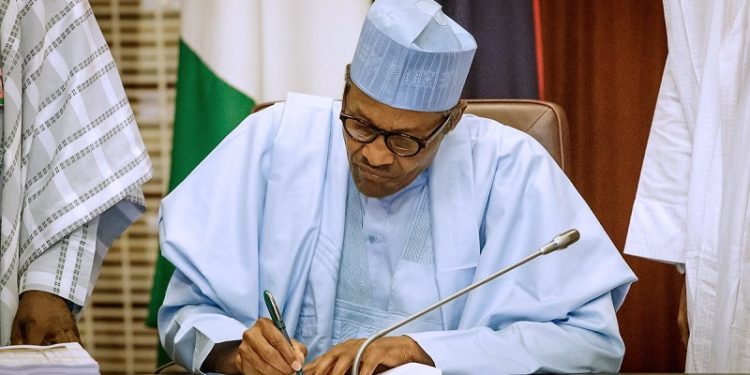President Muhammadu Buhari has approved the reopening of four land borders in the country with immediate effect.
The Minister of Finance, Budget and National Planning, Hajiya Zainab Ahmed disclosed this after the 28th virtual Federal Executive Council (FEC) meeting presided over by Vice President Yemi Osinbajo at the Council Chamber of State House, Abuja.
- Kidnapping: Over 5000 homeless, 30 abducted in Niger east – Sen. Musa
- Reps to investigate NSCDC, NIS recruitment exercise
President Muhammadu Buhari participated virtually at the meeting from his country home in Daura, Katsina State.
Hajiya Zainab said the remaining borders would be reopened on or before 31st of December, 2020.
The minister, who said restriction on the importation of some commodities like rice and other products would continue to be enforced, listed the land borders to be opened to include; Seme border in the South-west, Ilela border in the North-west, Maitagari border in the North-west, and Mfun border in the South-south part of the country.
She said: “I am here to just report that His Excellency, the President, approved the recommendations of the committee that I chaired with the Minister of Trade and Investment as member, Minister of Interior as member, Minister of Foreign Affairs as member, National Security Adviser as member and Comptroller General of Customs.
“This committee was mandated to review and advise on the reopening of the Nigerian borders and after recommendations, the President approved the reopening of four land borders, namely: Seme in the South-west part of the country, Ilela in the North-west part of the country, Maitagari in the North-west part of the country and Mfun in the South-south part of the country.
“So, these four land borders will be reopened immediately while the remaining borders are directed to be reopened on or before 31st of December, 2020.
“Mr President has also directed that while others are being reopened, the ban on importation of rice, poultry and other banned products still subsists and will be implemented by border patrol team.”
‘What we gained’
The Minister of Industry, Trade and Investment, Otunba Niyi Adebayo, while fielding questions from State House reporters on the advantages in the border closure, said: “We have many advantages to the border closure; it has given the security agencies an opportunity to access the problems at the borders particularly with regard to smuggling.
“As you are all aware before the border closure, a lot of petroleum products were being smuggled out from the borders to West African countries and the border closure has created a situation that has tactically stopped that.
“They have been able to calculate the amount of petroleum products being smuggled out by calculating the amount that is being lifted now compared to what was being lifted before.
“The issue of smuggling of rice to the country has reduced drastically and we are hoping that our agencies will be able to sustain that so also is the issue of poultry smuggling.
“Also, very important is the issue of importation of small arms and weapons into the country; that also has stopped.
“We are hoping and we are sure that this time around, our security agencies will be able to see that that doesn’t reoccur.
“These are the issues that caused the closure of the borders in the first place and we have been able to put a stop to them.”
Weapons, drugs are main targets – Buhari
Penultimate Tuesday, President Buhari, while speaking at a meeting with the state governors on the issue of security at the State House, Abuja, said the closure of the nation’s land borders was partly an attempt to control the smuggling in of weapons and drugs.
“Now that the message has sunk in with our neighbours, we are looking into reopening the borders as soon as possible,” he had said.
The President took the latest decision after receiving the report of a presidential committee constituted to advise him on the reopening of the nation’s borders.
Nigeria, the largest economy and the most prosperous of the 15-member Economic Community of West African States (ECOWAS), last year August, closed her land borders on account of the proliferation of illegal importation of drugs, small arms and agricultural products coming from neighbouring West African countries.

 Join Daily Trust WhatsApp Community For Quick Access To News and Happenings Around You.
Join Daily Trust WhatsApp Community For Quick Access To News and Happenings Around You.


